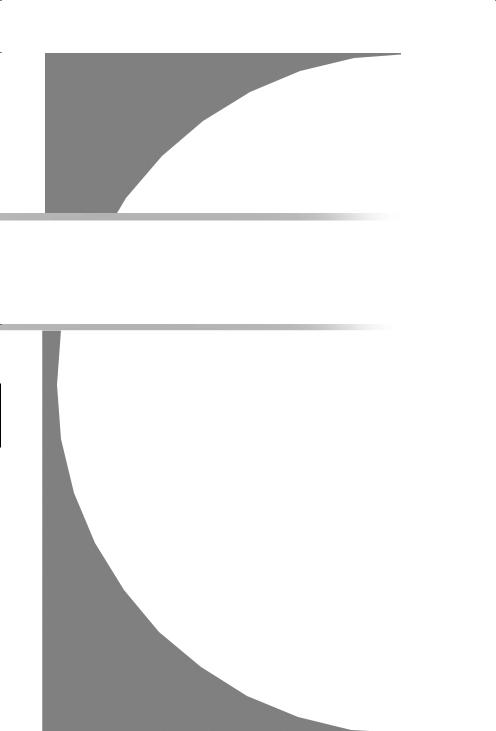
Tracy B., Fraser C. - TurboCoach[c] a powerful system for achieving breakthrough career success (2005)(en)
.pdfThis page intentionally left blank

CHAPTER 3
Study Your Competition
‘‘Facts do not cease to exist because they are ignored.’’
ALDOUS HUXLEY
In the last six months, have you spent any time learning more about your leading competitors? YES NO
Do you have a good idea of what your leading competitors are offering to the market? Are you familiar with their business or marketing strate-
gies? YES NO
............................................................
This chapter explores how to identify the individuals, both inside and outside your organization or business, with whom you compete for the same results and rewards. It will also help you start developing strategies that allow you to achieve superior results in the shortest period of time. The Application Exercise at the end of this chapter takes you through the steps necessary to identify what your customers are looking for, what your competition offers, and how you can maximize your offerings to meet
customers’ wants and needs.
.............................................
21
This page intentionally left blank

COMPETITION IS A FACT OF BUSINESS LIFE, regardless of whether you work for an organization or for yourself. Price setting (either as part of a salary negotiation or a marketing strategy) is a good example. How would you answer this question: Who determines the prices you charge or the salary level you set for yourself? Would you point to your level of sales or your market share, or perhaps your years of experience? Many people would say that their customers or employers set their prices. Others would insist that they set their own prices. In fact, all of these are key determinants of your ultimate professional or business success.
But the primary determinant is none of these. It is your competition in the marketplace. You have competition

24 |
|
|
|
|
|
|
|
|
|
|
|
|
|
|
|
|
|
|
|
|
|
|
|
|
|
|
|
|
|
|
|
|
|
|
|
|
|
|
|
|
|
|
|
|
|
|
|
|
|
|
|
|
|
|
|
|
TurboCoach |
|
|
|||||||||||||||||||
|
|
|
|
|
|
|
|
|
|
|
|
|
|
|
|
|
|
|
|
|
|
|
|
|
|
|
|
|
|
|
|
|
|
|
|
|
|
|
|
|
|
|
|
|
|
|
|
|
|
|
|
|
|
|
|
|
|
|
|
|
|
|
|
|
|
|
|
|
|
|
|
|
|
|
|
|
|
|
whether your company sells its goods and services in the open market or inside an organization, where you are competing for advancement or scarce resources. For this reason, it is essential to thoroughly research your competitors and know them as well as you know yourself.
Many people in a competitive situation make the mistake of dismissing the competition. The smart competitor does not look down on the competition, find fault with them, criticize them, or make light of them. She respects her successful competitors and makes it her business to study and learn from them.
Investigate your competitors. What did they do to win that promotion or get themselves hired for that job? What are their strategies and tactics for market penetration and market domination? How do they position their products or services? What alliances or networks do they build to ensure the success of their departments or divisions? Why do people buy from them? How do they service their customers or build relationships within and outside of the organization? What is their pricing policy? What new skills or training do they acquire to stay current? What is their approach to quality control? What volunteer or professional organizations do they join?
Once you have developed an extensive knowledge base and a good understanding of your competitors, look just as carefully at yourself and your own career or business. Identify your area of supreme excellence. What do you do at least 90 percent better than your competition? What is your Unique Selling Proposition (USP)—that one trait or skill you possess that delivers value or competitive advantage to your customers or others in your organization and that no other individual or company can offer?

Study Your Competition |
25 |
|
Once you have determined what it is that you do better than others in your career or business area, look outward. How will you position yourself or your product or service in the marketplace to capitalize on your area of excellence? What sales and marketing strategies will you adopt? Based on competitive pricing strategies, how will you price your products or services?
Maintain the broadest possible scope when you are conducting research on what the competition is doing. For example, if you are in business for yourself, you may find that, in some instances, the competition may not be another individual or company. You may find that you are competing against what appears to be another industry. For example, companies offering land-based vacations are direct competitors of the cruise industry. Both groups compete for the same vacation dollars.
Our goal in this chapter has not been to devise specific sales and marketing plans—we will deal with these in greater depth at a later point. Rather, the objective is to ensure that you are fully aware of the importance of competitive research, have a plan to conduct the research, and are committed to carrying it out. Having focus will greatly increase your odds of achieving your career and business goals.
Application Exercise
1.Who are your most successful competitors?
2.Why do your customers or potential customers buy from these competitors? What advantages and benefits do they perceive in buying from your competitors?

26 |
|
|
|
|
|
|
|
|
|
|
|
|
|
|
|
|
|
|
|
|
|
|
|
|
|
|
|
|
|
|
|
|
|
|
|
|
|
|
|
|
|
|
|
|
|
|
|
|
|
|
|
|
|
|
|
|
TurboCoach |
|
|
|||||||||||||||||||
|
|
|
|
|
|
|
|
|
|
|
|
|
|
|
|
|
|
|
|
|
|
|
|
|
|
|
|
|
|
|
|
|
|
|
|
|
|
|
|
|
|
|
|
|
|
|
|
|
|
|
|
|
|
|
|
|
|
|
|
|
|
|
|
|
|
|
|
|
|
|
|
|
|
|
|
|
|
|
3.What are your areas of excellence as an individual?
4.What are the areas of excellence of your business?
5.What is your Unique Selling Proposition—that is, what do you do that definitely benefits your customers that no other individual or company can offer?
6.What does your customer have to be convinced of to buy from you rather than from your competition?
7.What actions do you commit to take immediately as a result of insights gained in this chapter?
‘‘Great ideas need landing gear as well as wings.’’
C. D. JACKSON
This page intentionally left blank

CAN YOU IDENTIFY YOUR CUSTOMERS? Do you know whom you have to satisfy in order to survive and thrive in your career or business?
Customers come in two categories: internal and external. The definition of an internal customer is simple. It is anyone who depends on you for his or her success and anyone upon whom you depend for your success. Following this definition, internal customers include your colleagues and your staff. Professional advisers, such as attorneys and accountants, can also be considered your internal customers. In fact, everyone around you whom you help, or who helps you, is in some way an internal customer.
Your external customer is the one who buys what you

30 |
|
|
|
|
|
|
|
|
|
|
|
|
|
|
|
|
|
|
|
|
|
|
|
|
|
|
|
|
|
|
|
|
|
|
|
|
|
|
|
|
|
|
|
|
|
|
|
|
|
|
|
|
|
|
|
|
TurboCoach |
|
|
|||||||||||||||||||
|
|
|
|
|
|
|
|
|
|
|
|
|
|
|
|
|
|
|
|
|
|
|
|
|
|
|
|
|
|
|
|
|
|
|
|
|
|
|
|
|
|
|
|
|
|
|
|
|
|
|
|
|
|
|
|
|
|
|
|
|
|
|
|
|
|
|
|
|
|
|
|
|
|
|
|
|
|
|
produce. External customers are the focal point of all business success. Your ability to accurately identify this cus- tomer—the one external customer whose satisfaction determines the success of your business—is at the heart of every element of strategic planning.
Before you can successfully identify this crucial customer, you must answer several questions. How does your customer define value? Can you list the specific benefits your products or services deliver to this customer? Probing deeper, do you know what your customer really wants and needs from you in order to be completely satisfied? Can you say how your product changes or improves your customer’s life and work?
The twenty-first century is being referred to as the ‘‘age of the customer.’’ The customer is at the center of business transactions as never before. Your success and your rewards in life will be determined in large part by your ability to identify and satisfy your key customers.
If current trends continue, who will your customer be in the future? If you were to change your product or service offerings, who could be your customer? If you want to rise to the very top of your field, who should be your customer? What expectations will this customer have that you can satisfy by upgrading your knowledge, your skills, and your ability? With the benefit of hindsight—drawing from your current knowledge and experience—can you name any customers in your career or business with whom you would avoid working today? Does your current customer list include any names of people or businesses that should not be your customers?
You can answer this last question more easily if you group your customers into high-value and low-value segments. To do this, begin by identifying and analyzing the
